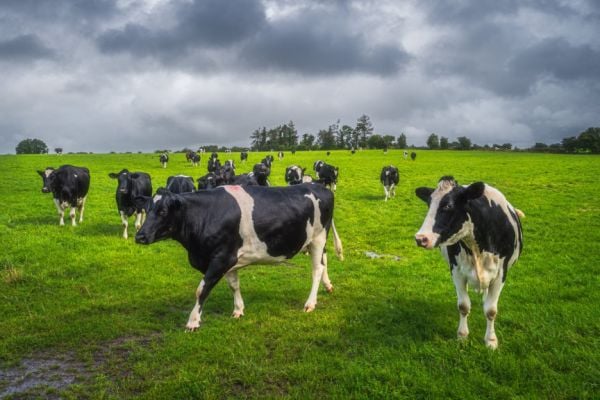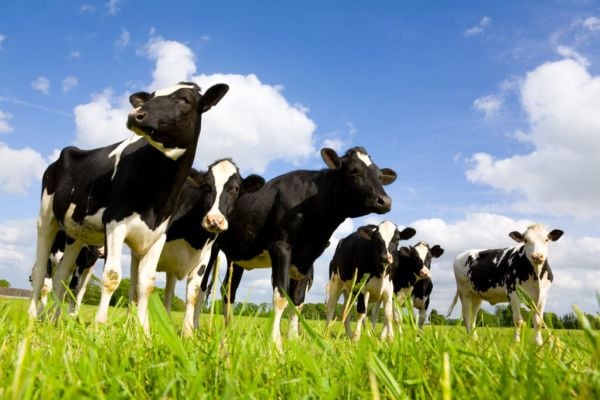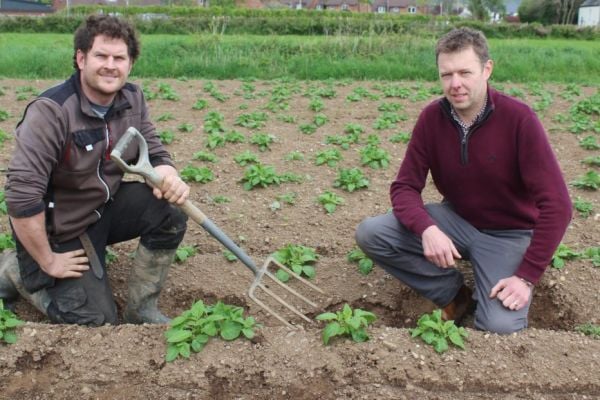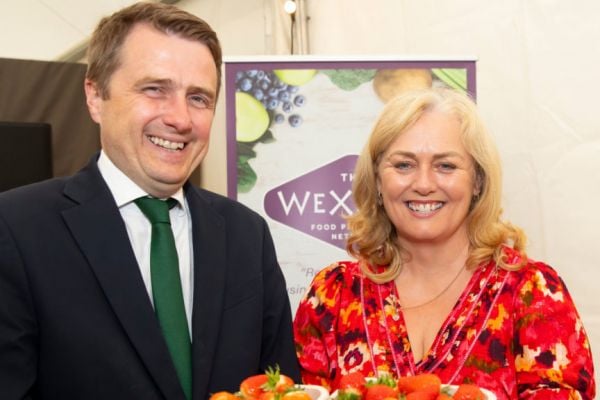The year 2021 was a turbulent period for the food and drink industry, with Brexit-related adjustments, rolling Covid-19 lockdowns, and rising commodity prices. Róisín O’Shea, head of the food and drink sector at Bank of Ireland, gives Maev Martin her perspective on how food businesses are coping.
Róisín O’Shea joined Bank of Ireland in 2019, and her role is to bridge the gap between the food company and the bank.
“Bank of Ireland is unusual among Irish banks, in that it hires people from a wide range of industry backgrounds to advise them on those industries,” Róisín says.
“If a food company is looking for a loan or to develop further, I would attend the meeting and provide an understanding to the bank as to what is going on with that company, rather than just looking at the financials. I look at its competitive set, marketing plan, and operations. That is something I can bring to the bank, as I have been working in the food industry for over 23 years.”
Róisín has held a number of senior commercial positions, including field sales manager, marketing controller, business unit director and commercial director, in both indigenous and multinational consumer goods companies, such as PepsiCo, Valeo Foods, Carbery, Boyne Valley Foods and Robert Roberts Ltd.
Her most recent role in the FMCG sector was with Boyne Valley, wherein she was commercial director of its sports nutrition brand, Kinetica.
“I’ve worked as a key account manager for many years, so I understand the FMCG market and the grocery retail sector, and the importance of the relationship between retailers and suppliers,” she says. “I also understand how difficult it can be to manage that situation, particularly at the moment, as the market experiences rising costs on all fronts.”
Bright Outlook Despite Costs
The Food and Agricultural Organization’s global basket of commodities, which covers a wide range of food, was up by 29% for 2021.
“For example, wheat was up by 29%, sugar was up by 38%, and vegetable oils were up by 71%,” says Róisín.
“Within Ireland, you have energy price rises, and the impact of oil costs is feeding into packaging costs. Some costs on cardboard are up by 45%, so it is a very difficult environment for food companies. Despite these pressures, Bank of Ireland is very positive about the prospects for our food customers, who have experienced a lot of growth in top-line sales this year. The sales figure is doing well, and some of that is to do with the ability of Irish producers to implement import substitution in the wake of Brexit. A lot of medium-sized manufacturers are picking up new contracts.
“However, their percentage margin has eroded because of commodity costs, and that is a difficult position over the long term. Suppliers could support it for a while – and they were reluctant to approach retailers with price increases – but, eventually, they had no choice. We haven’t seen those price increases come through in terms of the consumer price index yet, so that is indicative of continuing challenges in the supply chain.
“Our advice to companies in the food sector would be to build resilience into their business model. We are in a volatile environment in terms of costs, and I think that is going to remain over the next few years – particularly from a food perspective, as we increasingly encounter the effects of climate change – so the models need to be resilient in terms of liquidity and cash flow, but also in terms of positioning themselves to withstand longer-term risks,” Róisín says.
“Regarding liquidity and cash flow, Bank of Ireland are seeing a lot of firms in the sector using invoice discounting, as it allows them to have a flexible source of finance, to cope with supply chain pressures. When it comes to withstanding longer-term risks, the Sustainable Energy Authority of Ireland [SEAI] are offering a free energy audit for companies, where they send someone into a business to see how they might increase their energy efficiency,” she adds.
“This is something we would encourage all our customers to look at, as it helps to increase their resilience over the long term. Some operators who may have looked at sustainable energy products a couple of years ago and felt the payback was too long are now re-examining them, in terms of the current payback and the current energy crisis, so that is an area we are seeing growing at the moment. For the larger multinationals, and our home-grown large multinationals, it is a core focus, and that is increasingly filtering down to the SME world.”
Brexit Boosts
A boost for Irish food producers has been one of the knock-on effects of Brexit, as businesses source from closer to home and keep their supply chains more manageable.
“I have seen import substitution in a number of sectors, including in the distribution model, where some products would have been sourced directly from the UK, and now there is an opportunity for the distribution model to fulfil a need in the Irish market and grow both sales and cash margins,” Róisín says. “We have also seen a number of SMEs, in particular, pick up private-label contracts within Irish retail.
“However, at the moment, SMEs are challenged in terms of capacity. Many of our customers are looking at increasing their capacity on site, either in terms of warehousing or new lines, and there is an increased focus on automation because of the staffing challenges they are facing. I think the pressures on capacity became more widespread during the pandemic, but some sectors in the food industry were already struggling pre-pandemic, so many companies are, in the first instance, fulfilling the increase in orders that are coming through, but they are increasingly getting enquiries from Continental markets as a result of Brexit, and as capacity increases in the industry, this will yield dividends and increase the value of the sector.”
Róisín says that the extent to which the UK will implement border checks on Irish goods is the big unknown.
“For many Irish goods, we are sending small varieties and high volumes to the UK, and that makes customs checks less of an issue for exports than they are for imports, where you are sending high variety and low volume,” she says.
“I think operators are largely very well prepared and have contingency plans in place. However, there is no doubt that import checks, should they be implemented, will be challenging on smaller delivery quantities.”
Food Waste
Food waste and how companies are responding to that challenge is an area in which we will see a lot of development in the next two to three years, according to Róisín.
“As food commodity prices increase, there will be more of a focus on making the most of the food we have,” she says.
While the focus at the moment is on energy costs, the bank is also seeing a lot of work being done on packaging and product launches in the flexitarian and plant-based sector.
“There are very exciting developments in sectors like the mushroom sector, where we have a strong indigenous industry that is responding very well to this trend,” she says. “Mushrooms are a low-food-miles product that is fantastic from a health point of view.”
Extending Shelf Life
While we are seeing a lot of innovation in packaging that helps extend shelf life, particularly in terms of research into nanotechnology, to help manage the understanding of when a product is going past its best eating time, Róisín points out that this technology isn’t commercially available yet.
“That means that right now it is about doing lots of small things – elements such as best-before dates, clean preservatives to extend the shelf life of products, using data sets to predict consumer behaviour, and analysing wastage forensically back on the factory floor,” she says.
“It is interesting to see that Morrisons in the UK are proposing a sniff test on milk, rather than having a use-by date. Seven per cent of all fresh milk in the UK is wasted, and this is one proposal to combat that. There is also an increasing focus on the waste generated in the production process, which can still be very high, so it is about how that waste can be repurposed to become a value, rather than a waste, stream.”
Mega-Trends Remain
Róisín notes that, despite the pandemic, mega-trends such as health and wellness, the rise of the flexitarian eater, and clean-label products are still there.
“If anything, the interest in health and wellness has increased during the pandemic, and it is encouraging to see a number of strong launches in the sector from Irish set-up companies over the past two years,” she says.
“At Bank of Ireland, we understand the food sector very well, and we know that commodity increases have always come around, and that good operators know how to adapt to these challenges. We bring an understanding of that longer-term cycle to the table, as well as an understanding of the challenges that food companies are facing right now.”
© 2022 Checkout – your source for the latest Irish retail news. Article by Maev Martin. For more retail news, click here. Click sign up to subscribe to Checkout.









